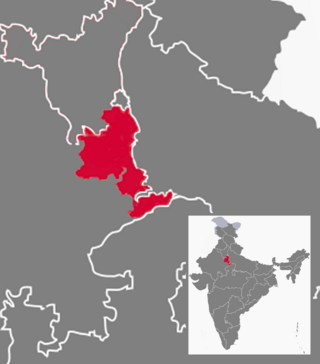
Alwar is a city located in India's National Capital Region (NCR) and the administrative headquarters of Alwar District in the state of Rajasthan. It is located 150 km south of Delhi and 150 km north of Jaipur.

Mewat is a historical and cultural region which encompasses parts of the modern-day states of Haryana, Rajasthan, and Uttar Pradesh in northwestern India.

Meo are a Muslim ethnic group originating from the Mewat region of north-western India.

Khanzada Mirza Khan Abdul Rahim, popularly known as simply Rahim and titled Khan-i-Khanan, was a poet who lived in India during the rule of Mughal emperor Akbar, who was Rahim's mentor. He was one of the nine important ministers (dewan) in Akbar's court, known as the Navaratnas. Rahim was known for his Hindustani dohe (couplets) and his books on astrology.
Muslim Rajputs or Musalman Rajpoots are the descendants of Rajputs in the northern regions of the Indian subcontinent who generally are followers of Islam. They converted from Hinduism to Islam from the medieval period onwards, creating various dynasties and states while retaining Hindu surnames such as Chauhan. Today, Muslim Rajputs can be found mostly in present-day Northern India and Pakistan. They are further divided into different clans.

Gurgaon district, officially known as Gurugram district, is one of the 22 districts of Haryana in northern India. The city of Gurgaon is the administrative headquarters of the district. The population is 1,514,432. It is one of the southern districts of Haryana. On its north, it is bounded by the district of Jhajjar and the Union Territory of Delhi. Faridabad district lies to its east. To its south lie the districts of Palwal and Nuh. To the west lies Rewari district.

Ferozepur Jhirka is a town and historical settlement in the Ferozepur Jhirka sub-division of the Nuh district in the Indian state of Haryana.

Nuh (Hind/Urdu: [nũːɦ], is a city and administrative headquarters of the Nuh district, located in the state of Haryana within the National Capital Region of India.
Tijara is a city and a municipality in Khairthal-Tijara district of the Indian state of Rajasthan. Tijara comes under the NCR area and is situated 55 km to the northeast of Alwar. The nearest railway station to Tijara is Khairthal. Bhiwadi is a census town in Tijara. It is the biggest industrial area of Rajasthan and part of the historical Ahirwal Mewat region. Tijara is dominated by Yadav and Meo community. The new political map has not erased the ancient Ahirwal-Mewat boundaries. Ahirwal was a post-Mughal principality ruled by Ahirs or Yadavs.

Raja Hasan Khan Mewati was a Muslim Khanzada Rajput ruler of Mewat. The son of previous ruler Raja Alawal Khan, his dynasty had ruled Mewat State for nearly 200 years. He was a descendant of Raja Nahar Khan Mewati, who was the Wali of Mewat in 14th century.
Shaheed Hasan Khan Mewati Government Medical College, is an Indian Medical College in the Nuh district of Haryana. The college is 75 km from Delhi on National Highway 8, 47 km from Gurgaon and 57 km from Faridabad. The college provides undergraduate medical education. The college is accredited by the Medical Council of India.
Raja Bahadur Nahar Khan was the ruler of Mewat and the progenitor of Khanzada Rajput clan who were themselves a sub-clan of Jadaun Rajputs. His original name was Sambhar Pal. He and his brother Sopar Pal embraced Islam during the era of Firuz Shah Tughlaq. He was also known as Wali-e-Mewat Raja Bahadur Nahar Khan
Wali-e-Mewat Raja Khanzada Bahadur Khan was the Khanzada Rajput ruler of Mewat. He succeeded as Wali-e-Mewat after the death of his father Raja Nahar Khan Mewati in 1402.
Wali-e-Mewat Raja Khanzada Akleem Khan, Bahadur, son of Khanzada Bahadur Khan Mewati, was the Khanzada Rajput ruler of Mewat from 1412 until 1417. He was succeeded by his brother Khanzada Feroz Khan as Wali-e-Mewat in 1417.
Wali-e-Mewat Raja Khanzada Feroz Khan, Bahadur, son of Khanzada Bahadur Khan, was the Khanzada Rajput ruler of Mewat State from 1417 till 1422. He succeeded his brother Akleem Khan as Wali-e-Mewat in 1417. Feroz Khan, proved to be an effective and popular ruler due to introduction of administrative reforms. He founded Ferozepur Jhirka in 1419.

Fateh-Ud-Duniya-Wa-Ud Din Wali-e-Mewat Raja Khanzada Jalal Khan Bahadur a.k.a. Jallu Khan, son of Khanzada Feroz Khan, was the Khanzada Rajput ruler of Mewat State from 1422 to 1443. He succeeded his father as Wali-e-Mewat in 1422.
Wali-e-Mewat Raja Khanzada Ahmad Khan Mewati, Bahadur, son of Khanzada Jalal Khan Mewati, was the Khanzada Rajput ruler of Mewat from 1443 till 1468. He was succeeded by his son Khanzada Zakaria Khan Mewati as Wali-e-Mewat in 1468.
Wali-e-Mewat Raja Khanzada Alawal Khan, Bahadur, son of Khanzada Zakaria Khan Mewati, was the Khanzada Rajput ruler of Mewat from 1485 till 1504. He was succeeded by his son Hasan Khan Mewati as Wali-e-Mewat in 1504. In 1492 he won Bala Quila from Nikumbh Rajputs to stop the practice of human sacrifice. It is also believed that the city of Alwar is named after him.
Firuz Khan Mewati was the first Nawab of Shahabad, Alwar and a Commandant in Mughal Army. He was a close confidant and trusted aide of Mughal Emperor Bahadur Shah I. He belonged to a Khanzada Muslim Rajput family which ruled the region of Mewat. He was a descendant of Raja Nahar Khan, who was a Rajput ruler of Mewat State in 14th century. Due to his loyal service in Mughal Army, he was granted the Jagir of Simbli by Emperor Bahadur Shah I in 1710.
The Mewat State was a sovereign kingdom ruled by the Khanzadas of Mewat. They were a ruling dynasty of Muslim Rajputs from Rajputana who had their capital at Alwar. The Khanzadas were Muslim Rajputs who descended from Raja Sonpar Pal who was a Rajput who converted to Islam during the period of the Delhi Sultanate in India.








